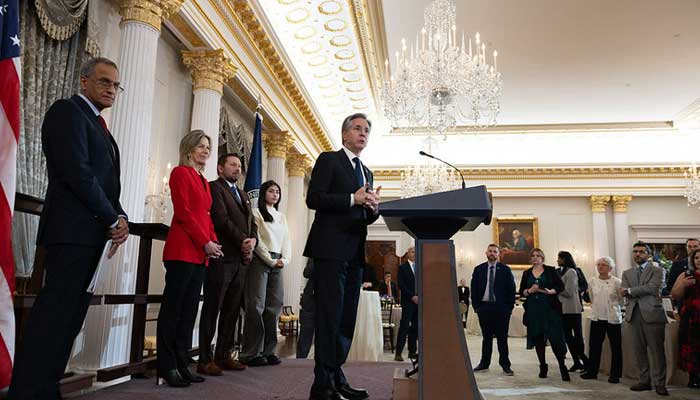The United States of America faced a mammoth task to evacuate hundreds of thousands of Afghans who feared for their lives as Kabul fell to the Taliban.
As the tenure of the Biden administration comes to an end, a ceremony was held to thank all those who helped in the evacuation process.
It didn’t highlight the plight of countries that had to host additional millions of fleeing Afghans. Yet, it mentioned those who played a part in providing a safe exit to some other destinations.
The gathering noted that since the US withdrew from Afghanistan on August 30, 2021, the Biden administration has relocated and resettled almost 183,000 Afghans. They are the ones who faced risks for having some connection with NATO forces.

They included interpreters, civil society activists, women leaders and their families who worked or stood for the USA and its allies during 20 years of invasion and occupation.
For many reasons, it was impossible for these families to stay back as the Taliban reclaimed Kabul on August 15, 2021. One of the rationales could even have been the way of their lives.
Sorting them out and that too in the least possible time was a herculean task. So, those who made it possible were recognised by holding this ceremony at the State Department.
US Secretary of State Antony Blinken was the chief guest. And the iconic Benjamin Franklin Room was filled with State Department officials, the core team of the White House, congresspersons, representatives of different countries and NGOs.
Blinken named Albania, Kosovo, the Philippines, Qatar, and the United Arab Emirates, and opted to thank rest by putting them in the group of ‘other countries,’ who had provided safe haven for Afghans on their way to their new homes.
He neither named Pakistan nor Iran who faced a new surge of millions of Afghan refugees since the Taliban took over the war-torn country.
May be because of the fact that the evening was basically dedicated to the ‘Welcome Crops,’ a programme launched in 2023 by the State Department. This scheme provides a chance to American citizens to sponsor refugees in their communities.
The leading role was played by AfghanEvac who had collaborated with a number of other NGOs and people. Hence, Washington was able to resettle almost twice as many Afghans to the United States in 2024 than the year before.
Antony Blinken told the audience that, “more than 125,000 Americans have applied through Welcome Corps to be sponsors”.
Yet, a lot more is needed as still there are many who are awaiting their turn by staying in temporary shelters provided by other host countries.
Other speakers included President Biden’s Homeland Security Adviser Liz Sherwood-Randall. She is among those who played a pivotal role in coordinating the relocation and resettlement.
Liz admitted that the bureaucracy was not designed for this uphill task. Hence, it needed to build a whole new system of welcoming refugees on this scale.
On behalf of President Biden and the whole White House team, she thanked those who played their part in sorting out issues and resettling those who had worked for the USA.
“We together have undertaken a noble effort that truly showcases the best of who we are as Americans: helping the Afghans who stood with the United States and in so doing helping our fellow Americans to be open to the continuing promise of America and to fulfil the obligation that many of us feel to our partners,” Liz remarked with gratitude.
She also reminded the newcomers that, “Settling into a new country is hard. Making connections in a place where you don’t yet have the language and where there are completely new customs, you do depend on the kindness of strangers and the willingness of government at the federal, state, and local level to help you.”
Shawn VanDiver, the founder of AfghanEvac, which is dedicated to coordinating efforts to assist Afghans relocating and resettling out of Afghanistan also spoke on the occasion.
The Navy veteran began his speech by applauding international friends including Pakistan.
“I also want to express my deep gratitude to our international partners who are in attendance from Qatar, Albania, Kosovo, Pakistan, the Philippines, and more. Without your support this work just wouldn’t continue.”
Then he portrayed the picture of Kabul as the Taliban took over Afghanistan and acknowledged the services of those who volunteered their time, talent and treasure to make a difference in the lives of fleeing Afghans.
“When Kabul fell, we were faced with ruin, chaos, heartbreak, unimaginable loss. Lives were lost, dreams were dashed, and hope seemed distant. But in that ruinous moment there were glimmers of hope: all of you.”
By comparing $2.23 trillion, reportedly spent on the Afghan war, with about $2 billion a year used up for resettlement efforts, VanDiver asked the participants to also measure the lives saved by evacuation.
Florence Pouya, a young Afghan studying aerospace engineering at MIT and dreams of becoming first female Afghan astronaut was also in attendance. She told her story of leaving Afghanistan at 15 and how she spent two years of uncertainty in Qatar.
The walls of the historic venue were decorated by the paintings drawn by kids as they desperately waited to board the planes to the United States. Some had painted their loved ones or scenic views of their motherland.
Antony Blinken highlighted the one that bore a line from the 13th-century Persian poet Jalal al-Din Muhammad Rumi, at the bottom of her painting.
It had a famous quote, “In this earth, in this soil, in this pure field, let’s not plant any seeds other than seeds of compassion and love.”
It is unfortunate that be it the British, the Soviets or the Americans, no ‘invading’ superpower of its time could sow the seeds of compassion and love. They only left the country by either spreading thorns for the people or the region at large.













